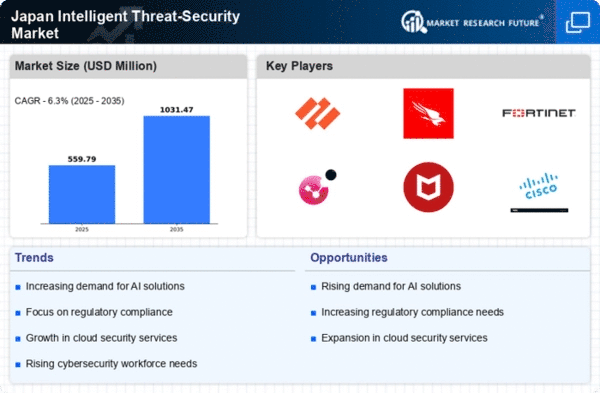Shift to Remote Work
The shift to remote work in Japan has significantly impacted the intelligent threat-security market. As organizations adapt to flexible work arrangements, the attack surface has expanded, creating new vulnerabilities. Remote employees often access corporate networks from unsecured locations, increasing the risk of cyber threats. Consequently, businesses are compelled to invest in intelligent threat-security solutions that can secure remote access and protect sensitive data. The market is projected to grow by 15% in the next few years, driven by the need for secure remote work environments. This trend highlights the necessity for organizations to implement comprehensive security strategies that address the unique challenges posed by remote work, ensuring the protection of their digital assets.
Increasing Cyber Threats
The rise in cyber threats in Japan has become a critical driver for the intelligent threat-security market. With incidents of data breaches and ransomware attacks escalating, organizations are compelled to invest in advanced security solutions. Reports indicate that cybercrime costs Japan approximately $1.5 billion annually, prompting businesses to prioritize cybersecurity. The increasing sophistication of attacks necessitates the adoption of intelligent threat-security measures, which can proactively identify and mitigate risks. As a result, the market is expected to grow at a CAGR of 12% over the next five years, reflecting the urgent need for robust security frameworks. This trend underscores the importance of investing in intelligent threat-security solutions to safeguard sensitive information and maintain operational integrity.
Technological Advancements
Technological advancements play a pivotal role in shaping the intelligent threat-security market. Innovations in artificial intelligence, machine learning, and big data analytics are enhancing the capabilities of security solutions. In Japan, the integration of these technologies allows for real-time threat detection and response, significantly improving the effectiveness of security measures. The market for AI-driven security solutions is projected to reach $3 billion by 2026, indicating a strong demand for intelligent threat-security systems. Furthermore, the continuous evolution of technology necessitates that organizations stay ahead of potential threats, driving further investment in advanced security solutions. This dynamic environment fosters a competitive landscape, compelling companies to adopt cutting-edge technologies to protect their assets.
Growing Regulatory Landscape
The evolving regulatory landscape in Japan is a significant driver for the intelligent threat-security market. With stringent data protection laws and compliance requirements, organizations are increasingly required to implement robust security measures. The Personal Information Protection Act (PIPA) mandates that businesses take necessary precautions to protect personal data, which has led to a surge in demand for intelligent threat-security solutions. Companies face substantial penalties for non-compliance, which can reach up to ¥100 million. This regulatory pressure encourages organizations to invest in comprehensive security frameworks that not only meet compliance standards but also enhance their overall security posture. As a result, The market is expected to grow as businesses align with regulatory expectations..
Increased Awareness of Cybersecurity
There is a growing awareness of cybersecurity among businesses in Japan, which serves as a crucial driver for the intelligent threat-security market. As high-profile cyber incidents make headlines, organizations are becoming more cognizant of the potential risks and consequences of inadequate security measures. This heightened awareness is prompting companies to allocate larger budgets towards cybersecurity initiatives, with an estimated increase of 20% in spending over the next year. The intelligent threat-security market is benefiting from this trend, as businesses seek to implement advanced solutions that can effectively combat emerging threats. This shift in mindset reflects a broader recognition of the importance of cybersecurity in maintaining business continuity and protecting valuable assets.
















